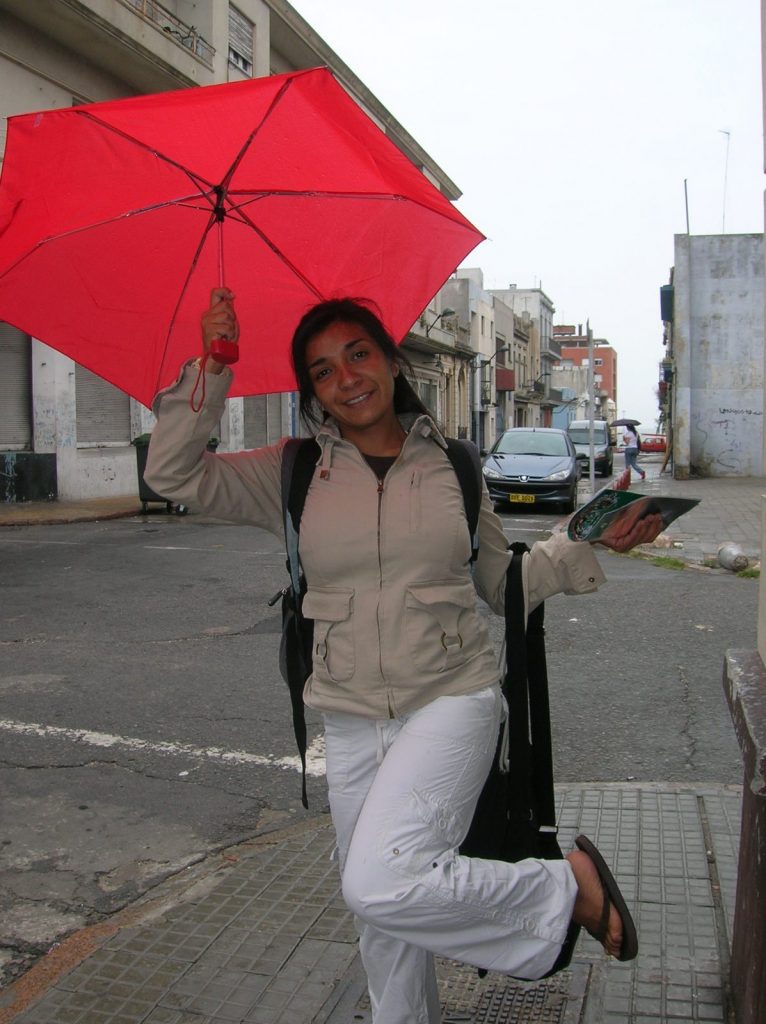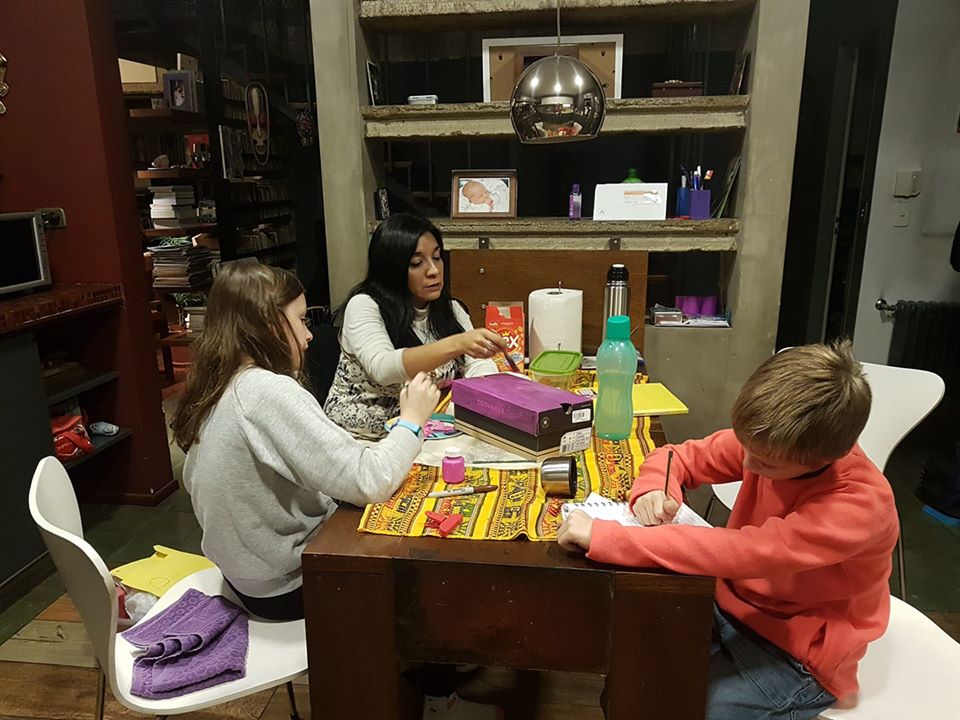Lorena currently teaches Language and Literature in secondary school, Business English in a hotel management and tourism school, and Aviation English in a civil and commercial aviation degree course—not to mention she has private students that go from ages of four to 64! If you already think that Lorena is a TEFL superstar, just wait til to you learn more of her story from teaching English in Argentina.
You are a Native Argentinian teaching English in Argentina. Incredible! Tell us about your path to teaching English as a second language.
I went to a bilingual school in Buenos Aires and started learning English at the age of three. When I finished school, I wanted to study Psychology at a private university, so I had to work to pay for the course of studies. I worked as a secretary and as a real estate agent, but those jobs were definitely not for me.

While trying all these jobs, I replaced a former teacher in my own school for almost two months and I enjoyed immensely. Luckily, I was later offered a position at an institute to teach English to 7-year -olds, as I had sat for Language and Literature IGCSE exams and had an IB diploma that backed up my knowledge. Since then, that’s 25 years ago now, I have never stopped teaching.
What TEFL course are you working on and what motivated you to become TEFL certified?
I’m currently working on the 290 Hour TEFL Training Master Course which includes the 168-hour Ofqual-regulated TEFL course. I decided to become TEFL certified mainly because I had to interrupt my studies at the teachers training college some years ago due to working long hours in many different places. I always wanted to finish, but I needed a course that could work out with my busy schedule.
I researched online courses and ended up choosing Premier TEFL because it provided all the certificates I needed to back up my experience in the field and was listed among the top five recommended courses for their service, expertise and professionalism.

What advice do you have for individuals considering using their TEFL certificate in a non-traditional way to use their skills in their home communities?
In my own experience, teaching English has been an excuse to keep on learning and I have been lucky enough to earn a living by doing what I love the most. If you are curious, get easily bored, and like facing challenges, the sky’s the limit.
Any job I have been offered in the field, whether it ‘d be teaching young learners, business English in companies, private students with special needs as travelling to English-speaking countries on their own or university students having to deal with papers related to biology, law, or even sitting for international exams to study or live abroad, I have agreed to do it. That’s how I have broadened my knowledge and have satisfied my curiosity to learn about how the world is and works. It has been a great excuse to meet people from all walks of life.

The best way in which you learn something is by having to teach it. So I have spent long hours doing research, planning, and studying to teach, but I have enjoyed every step of the way.
What has surprised you most about teaching English as a foreign language?
I guess that the fact that people open up more easily when they are speaking a foreign language. They express feelings and tell you stuff that they wouldn’t dare say in their own language. That’s when being a psychologist becomes handy.
I once had a student who was going through a rough time at work and I thought he would cancel his lessons for a while till everything calmed down. Instead, he told me “I need my lessons, but don’t bring the teacher, just the psychologist.”

By the way, two of my best friends were former students. One of them is living now in the US, she is only 25 and happily married. The other one is 55 and I have been the teacher of her two children, who are now 25 and 27 respectively. And I have become “Aunt Lore” for them.
What advice do you have for individuals considering getting a TEFL certificate?
Back in the day, there was no Internet, so getting a TEFL certificate could only be possible if you attended classes. Plus, doing research meant sitting in a library for hours or, if you were lucky enough, you would get all your information from kind colleagues who were willing to share.
By getting a TEFL certificate, you are narrowing the path between what you need to know and what you are expected to offer in any job. It will make you feel you have the necessary tools to face any teaching position and will provide your employers with the necessary red tape to offer you a post.

Tell us about your favourite student/class and what you love most about them—heartwarming stories encouraged! 
After 25 years of teaching, it’s very difficult to pick out a student or a class. (I tell you 2 anecdotes, and you pick out the most suitable. Deal?)
Once, I had a student who worked for a bank and was taking private lessons to improve his English. His ambition was to be promoted, but he was reaching the age of 40 and his goal was getting further away. He insisted on going through grammar points, such as conditionals, but I knew that what he needed was to polish his speaking skills, as he blushed with embarrassment every time he spoke a word. So, I compromised and gave him boring conditional exercises to practice. Long story short, he never got to finish those exercises, because I kept interrupting him with questions about his job and he had no choice but to answer and speak.
He finally got promoted two positions over his supervisor and his manager over a period of a year and a half. Top tip: Students know what they want but they do not always know what they need.

Last year I had a group of lovely 13-year-olds. I was their language teacher and they were very supportive when my dog passed away and, later on, when my father was hospitalised. We bonded so gracefully and you will never know how sweet teenagers can become until you give them a chance.
In sophomore year, they are encouraged to do community service in a slum in the city and spend time with children living in very poor conditions. They prepare games and activities to share with these kids and are accompanied by their tutors. For the first time in 12 years of teaching in this school, they have invited to share this experience with them and have made me part of their team. Whenever I can’t make it because I need to fulfill other responsibilities, they make me promise I will come with them the next time. Quite an honour!
What have you learned most about yourself in your last 25 years of teaching English?
First thing I learned when I became a teacher was to listen to my own voice. I was and am very shy. People don’t believe this fact about me, especially my students because I have developed through many years of teaching, the necessary skills to perform a confident role in front of my audience. But the truth is that I still sweat the first couple of lessons until I get used to having so many eyes on me. Plus, I remind myself that it’s not me but what I’m saying that ‘s more important. It’s only then that I can swim like a fish in the classroom.

I sound different when I speak Spanish. Many of my students ask me not to speak Spanish when they are around, as I sound as somebody else and they have certainly got used to me speaking in English.
I have also learned that I don’t need to have all the answers. Learning to say “I don’t know, but I will look it up for you”, or “I have no idea, tell me about it”, “Excuse me, what is that about? Never heard of that before”, empowers me as a human being and empowers my students in their learning process. With no questions, there are no answers and there is no knowledge.
Smile. Always smile. Smiling opens doors and hearts.
Have a sense of humour. That’s something students usually don’t expect and it relaxes them and you.
Plan lessons which are engaging for them and you. Passion is contagious.
Listen. Listen. Listen. And ask many questions. Be genuinely curious about whatever topic you’re talking about. You will learn more than expected and you will be surprised about what people have to say, no matter how old they are. 
Be ready to take your students advice and improvise. Sometimes they come up with better ideas than whatever master class you have planned. If your master class is not engaging, be ready to change. Always have a plan b.
Be sweet and firm. Silence works better than shouting. In the long run, your students will appreciate it more and will respect you for keeping calm and under control.
Learn your students names. They love it when you show them you know who they are. Plus, you can brag about what a good memory you have.
Respect and tolerance is a give and take game. So play it every step of the way.

What would you tell other TEFL teachers considering moving to Buenos Aires to teach English?
Buenos Aires is a very hectic, eclectic and multicultural city. It offers a whole lot of places to visit and learn from museums with international exhibitions and amazing works of art, great bars and restaurants to try the most delicious and exotic food from all over the world, as well as our specialities: dulce de leche and mate.
There are huge concerts every year and theatres offer renown plays and musicals with fantastic actors and actresses. Plus, its people are very friendly and it’s a city that never sleeps. I have lived here all my life and there’s always a new experience to discover.
Thank you so much, Lorena and best of luck as you complete your course!
The post Meet Lorena – TEFL teacher in Argentina appeared first on Premier TEFL.


